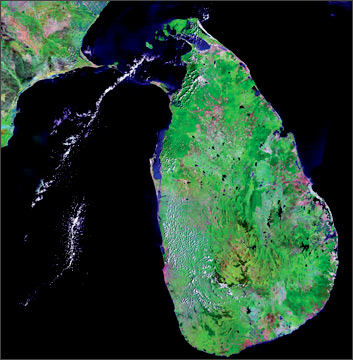Strengthening Indo-Lanka relations
"The reasons why the text of CEPA (Comprehensive Economic Partnership
Agreement) could not be concluded in time for its signature at the SAARC
Summit was because certain aspects in it needed to be more fully
considered by some sections of the corporate sector" said Nihal Rodrigo,
the moderator of the seminar on 'India-Sri Lanka Relations:2025'.
 Rodrigo who is an Honorary Advisor (Foreign Relations) to the
President and one-time Sri Lanka Ambassador to China said that extra
time spent on the CEPA would be well worth it given the benefits it
would bring to all concerned. Rodrigo who is an Honorary Advisor (Foreign Relations) to the
President and one-time Sri Lanka Ambassador to China said that extra
time spent on the CEPA would be well worth it given the benefits it
would bring to all concerned.
Renowned Indian economist, Seshadri Chari stated that certain
monitoring and regulatory processes within the Sri Lanka business sector
is a cause of concern as implementation is not enforced properly. In
addition to this, there have been fears that CEPA will give advantage to
Indian professionalism by flooding the Sri Lankan market thus robbing
the local talent of their jobs. Moreover, there are no proper control or
suitable mechanism with which to determine what type of investment Sri
Lanka really needs which has been the result of the FTA where Sri Lanka
still does not have proper mechanism to measure usage of it.
Past President of the National Chamber of Exporters, D. Kulatunga
Rajapaksa said that the CEPA was not signed because the views of key
stakeholders in the Sri Lankan business community weren't effectively
taken into consideration.
Governor of the Central Bank, Ajith N. Cabraal said "Since India is
Sri Lanka's neighbour and likeliest partner we should invest wisely by
moving together because India on par with international standards that
can even rival that of China". Former Indian High Commissioner to Sri
Lanka, N. N. Jha said that the Indo-Sri Lanka Peace Accord should have
been signed with LTTE leader Prabakaran and Sri Lanka's former President
J.R.Jayewardene with India as a moderator and not India and Sri Lanka
signing it on a problem faced by Sri Lanka.
The seminar was conducted in four sessions that included Historical
and Cultural Ties of the Past, Present and Present where discussions
took place that introductions to all the religions of India and Sri
Lanka are taught in every school curriculum to promote understanding.
The sessions after that included Economic and Trade Relations, Social
and Political Relations and the Lessons Learnt and Future Vision.
It was observed with various discussions by the participants that by
signing the CEPA agreement, benefits will accrue. (N.D.) |

